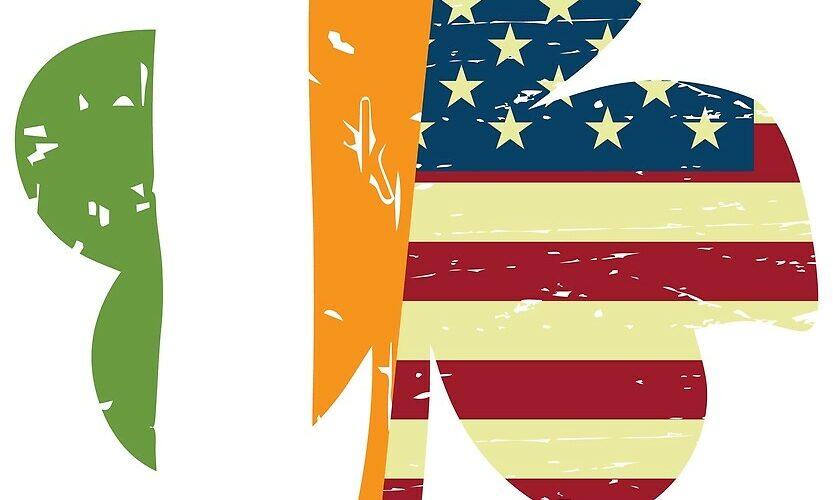Mainstream culture and politics is invested in the idea that the age of nationalism has ended. Liberals proclaim that the world economy has been thoroughly globalised, and therefore nations are no longer of importance. Yet, as usual, reality serves to upset the declarations and pronouncements of liberal commentators.
The question of nationality and nationhood has not ceased to be of immense importance. Two recent momentous events indicate this enduring significance: Ireland’s recent election in the South and the current uprising in the United States.
In the United States these attacks from below on the imperialist, neoliberal establishment emerged from a dreary foundation of high unemployment, worsening working conditions, rising living costs, crumbling public services, and much else that characterises the downward spiral of recent decades. Yet what ignited these assaults was more than just these economic considerations: the question of nationality was the spark that lit the prairie fire.
African-Americans are an oppressed nation within the white supremacist United States. This is a settler-colonial country, its wealth and power built on the exploitation and murder of Africans and indigenous peoples. This material foundation has not changed. Brutal exploitation lives on in content while merely its form has altered. A glance at statistics relating to oppressed nationalities in prisons, police brutality, economic deprivation and much else besides will reveal that there has been no revolutionary transformation away from this foundation of a settler-colonial imperialist project. As a result, the revolutionary struggle of oppressed nationalities has proved to be the crucial struggle throughout American history.
The African-American communist Harry Haywood (1898–1985) dedicated his life to placing the black national liberation struggle at the centre of revolutionary politics. He wrote that “such a [national] movement would inevitably culminate in the demand for political power . . . The Black liberation struggle would be, as it had always been, a spark, a catalyst pushing forward the whole working-class and people’s struggle in the U.S.” And indeed the murder of George Floyd has served as the spark for upheaval throughout the United States, the kick that pushed the strangled masses into action.
This year the Irish political establishment in the South was irreparably shaken. The shock victory of Sinn Féin was a historic blow to the iron grip Fianna Fáil and Fine Gael have held over the Irish state for a century.
The significance of the recent RIC (or Black and Tans) commemoration scandal cannot be underestimated in accounting for Sinn Féin’s success. This invitation to “grow up,” to forgive and forget the brutality of British imperialism, sent waves of righteous indignation throughout the country. The establishment has advised us to forget airy-fairy notions of “nationhood” or “unity”: we should be solely concerned with making money and buying a house or two. We’re a cog in a global system, doing our small part to help American billionaires become trillionaires.
Yet the people of Ireland have taken a tentative step in rejecting the philosophy that the Southern statelet was built upon: subservience to imperialism. The ruling class of Ireland, like most ruling classes, has been preoccupied with rejecting a fundamental law of reality, that change is the only constant, and intend to keep the country divided and beholden to British, American and European interests for ever.
But the working class of Ireland have no interest in playing the role of servant to imperial masters—in fact it’s entirely at odds with their material interests.
Republicanism is the inevitable manifestation of this contradiction, and it has served as the radical philosophy of all broad-based revolutionary struggles in this country for many centuries. For now, Sinn Féin represent this longing for national sovereignty, even if far more radical politics will be necessary in order to achieve it. Attacks on our republican tradition (equating it with the far-right, terrorism, etc.) and attempts to gloss over our colonisation represent the Southern ruling class’s attempt to undermine this burgeoning trend and hold stagnant the forward movement of history. The people of Ireland will not be fooled.
But why do I speak of these two issues together? Because they are inseparably linked. The striving for national liberation has ever been the greatest enemy of imperialism, whether that’s in Ireland or with the Black nation in the United States. American capital feeds off the whole world, and a weak, divided Irish working class is easier to exploit and steal from than is a disempowered and brutalised Black working class.
The same forces that strangled George Floyd to death have strangled the entire world for centuries. We must not look down in pity at our comrades across the pond: we must recognise our shared struggle and fight together along such lines. The outpouring of support for George Floyd on a global scale is an indication of this understanding.
The uprising in America is not a single-issue affair: it is an attack at the heart of a global system of exploitation—“a clarion call to all oppressed peoples throughout the world to rise up and defeat imperialism.” The liberal establishment believed it had smothered the desire for national liberation, but its necessity for the working class is asserting itself once more. The best service we could offer the colonised African-American nation is to build an independent socialist republic that stands firmly in solidarity with them, rather than aiding and abetting their oppression at every turn—rather than laundering their oppressors’ profits and refuelling their warplanes. Likewise the victory of the Black liberation struggle would spell the end of the US empire and its exploitation of our country.
As ever, “patriotism is applied internationalism.” The Irish people are coming to recognise this reality.
Sources and further reading
(all available at cym.ie/education)
- James Connolly, Socialism and Nationalism
- Harry Haywood, “We Have Taken the First Step on a Long March”
- Ho Chi Minh, The Path Which Led Me to Leninism
- Liu Shaoqi, Internationalism and Nationalism
- Mao Zedong, Quotations from Mao Zedong, chap. 18: “Patriotism and internationalism”
- Huey P. Newton, Functional Definition of Politics






